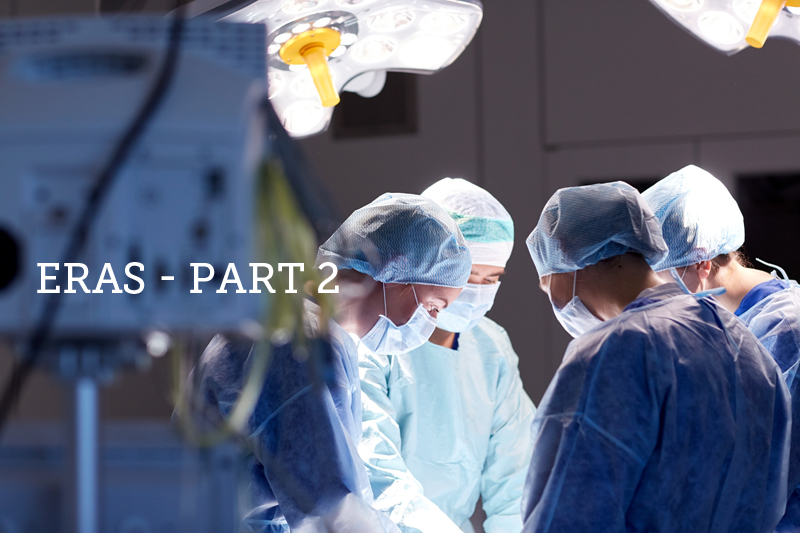Dietitian Blog, MNT Guidelines | Jun 15 2020
Part 2: Nutrition’s role in ERAS | Enhanced Recovery After Surgery series

One central component of Enhanced Recovery After Surgery (ERAS) protocol is improved provision of pre- and post-op nutrition in patients undergoing elective surgery. ERAS focuses on the reduction of physiological stress to promote faster recovery.
And in fact, many of the aspects of ERAS protocols, including IV fluid provision, analgesia selection, and anesthetic technique, are designed to support early post-op feeding. Read on to find out how nutrition earned a starring role in the world of fast-track surgery.
Let them eat carbs!
Requiring patients to fast after midnight on the night before an elective surgical procedure is a tradition many physicians still apply. However, there seems to be no support in the literature that this practice is necessary. In fact, the American Society of Anesthesiologists now endorses the allowance of solids foods up to six hours before a procedure and clear liquids up to two hours before.
ERAS not only eliminates the midnight fast, it recommends pre-op carbohydrate loading. With this technique, patients are provided a clear, carbohydrate-rich beverage (100 grams of carbohydrate) on the night before surgery and another beverage (50 grams on carbohydrate) two hours before surgery on the day of the procedure.
Pre-operative carbohydrate loading reduces thirst, hunger, anxiety, and perhaps most importantly, post-op insulin resistance and hyperglycemia. Allowing patients to eat (and drink) puts them in an anabolic, rather than catabolic, state prior to surgery.
“Wetter is better?”
Intraoperative fluid management is generally decided by the surgeon and/or anesthetist. Traditionally, liberal IV fluids have been given during surgery under the slogan, “wetter is better.” In other words, there’s no such thing as too much fluid.
ERAS turns this strategy around and recommends providing only the fluids necessary to maintain fluid balance. Likewise, consideration should be given for the judicious use of vasopressors, rather than IV fluids, to maintain intraoperative blood pressure.
Fluids should be discontinued altogether when the patient is able to take sufficient fluid intake by mouth, ideally on post-op day one, which brings us to…
Early post-op feeding: Let them eat, again!
As previously mentioned, many components of ERAS are focused on providing better nutrition care. Strategies like prophylactic treatment of post-op nausea/vomiting, avoidance of opioid-based analgesia, forgoing routine nasogastric decompression, utilization of epidurals, reduction of IV fluid usage (particularly those with high saline concentrations), early post-op mobilization, and routine post-op bowel regimens all facilitate faster GI recovery and resumption of oral or enteral feeding.
ERAS maintains there is no benefit to prolonged post-operative NPO. Early post-op feeding can commence as early as four hours after surgery and is generally well-tolerated, especially when all of the aforementioned strategies are utilized. The best post-op feeding approach includes oral nutrition supplementation and can reduce post-op infection rates, hospital length of stay, and improve patient satisfaction.
What’s next?
In our final installment of the ERAS Series, find out how implementing an ERAS protocol at your facility will transform patient outcomes. Stay tuned!
Dietitians On Demand is the nationwide leader in staffing registered dietitians, specializing in short-term, temporary and permanent-hire positions in acute care, long term care and food service positions. Our dietitians cover a vacancy, maternity leave, vacations, FMLA or increases in census. Check out our job openings, or request your coverage today!
References:
American Society of Anesthesiologists. Practice guidelines for preoperative fasting and the use of pharmacologic agents to reduce the risk of pulmonary aspiration: application to healthy patients undergoing elective procedures. Anesthesiology. 2017;126(3):376-393.
Fearon KCH, Ljungqvist O, Von Meyenfeldt M, et al. Enhanced recovery after surgery: a consensus review of clinical care for patients undergoing colonic resection. Clin. Nutr. 2005;24(3):466-477.
Who we are
Dietitians On Demand is the nationwide leader in providing dietitians with jobs they love. If flexibility, competitive pay, a full benefits package, free CPEUs each month and a team dedicated to dietitians sound good to you, apply to our positions today.





